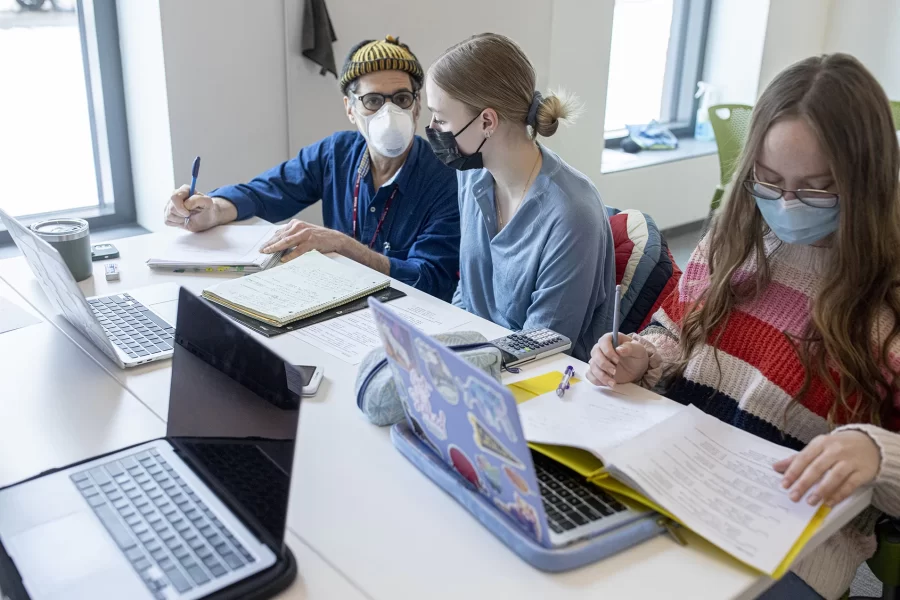W2 Requirement
Communication in written and oral forms is an important skill for any scientist.
Communication often occurs in a technical form with colleagues in the discipline, and at a different level with those outside the discipline. Scientists must be skilled in communicating with both of these audiences. Scientists who cannot write well — or effectively express themselves and their ideas in words — are at a disadvantage in the job search and in the execution of their professional work.

Like most things, the key to more effective writing starts with opportunity and practice. It also involves the chance to revise documents based on constructive feedback from a knowledgeable evaluator. In order to give students the necessary opportunities to practice writing, and believing that writing must infuse the curriculum rather than occur within only a single course or two, the Chemistry Department has purposefully designed a curriculum that incorporates writing exercises throughout. These exercises begin in introductory courses and progress through advanced courses and a senior thesis. In this way, the W2 requirement is distributed throughout the required curriculum for the major rather than residing in a particular course. Development of the W2 goals through the entire curriculum will allow us to retain the important role of exams or problem sets that are critical to other learning goals within the chemistry curriculum.
The writing component of the majors is designed to:
- Teach the principles of good writing: Building the simplest possible words and sentences into concise, well-ordered arguments, using the paragraph as the basic unit of composition. The rules for this have been written down many times. Strunk and White’s The Elements of Style is notable for its elegance and concision.
- Teach students how to describe chemical and mathematical concepts in words. This includes being able to describe the interpretation of data and the conclusions drawn from an analysis of data. Drawing conclusions involves the construction of an argument based on an interpretation of data. When appropriate, evidence from the literature is often used to support the argument.
- Teach students the mechanics of writing a scientific paper following ACS guidelines. This includes learning how to communicate well with graphs, tables, diagrams and other visual materials.
- Teach students the skills needed to write about science for broader audiences: notably, policy makers and the public.
How we accomplish these writing goals:
- At the introductory level, most writing assignments occur in the laboratory. The B sections require students to write two substantial lab reports. In the A sections students write more, generally shorter, lab reports that vary in style. There are other 100-level courses and first year seminars that provide students with writing opportunities.
- At the intermediate level, several of our courses have writing attentive components. These include CHEM 215, where students write and revise two papers on the relationship between atomic structure and function on two different topics; CHEM 212, where students write a proposal for a semester-long laboratory project and a final report on the project, S42 where students write extensive lab reports that model journal articles, CHEM 321 and CHEM 322 where students write substantial lab reports, CHEM 301 where students have an on-going writing assignment that asks them to translate the mathematical concepts they are learning into words that enable them to describe their developing understanding of quantum theory.
- At the advanced level, all of our students write a writing attentive senior thesis. Summarized below is a list of the specific details of the W2 requirements that each of our courses will meet. Almost all of our courses at the 200 and 300-level will incorporate some attention to writing. With approval of our plan, the writing component of several of these courses will be augmented. These planned changes are included within the list provided below. It is our expectation that students who take at least three of our 200 or 300 level courses will complete the W2 requirement. Three of the courses in the list below (CHEM 212, 215, and 301) are required for the major. As a result, most of our majors will take more than three of the courses from the list.
To implement this, we propose to create a class “Intermediate Level Writing in Chemistry” CHEM 347 that is a 0 credit course, offered both fall and winter, that has as its pre- or corequisite any three of the following.
- CHEM 215
- CHEM 212
- CHEM 321
- CHEM 301
- S42
- CHEM 325
- CHEM 327
- CHEM 310
- S37
Biochemistry majors may also fulfill the W2 requirement by completing BIOL 242.